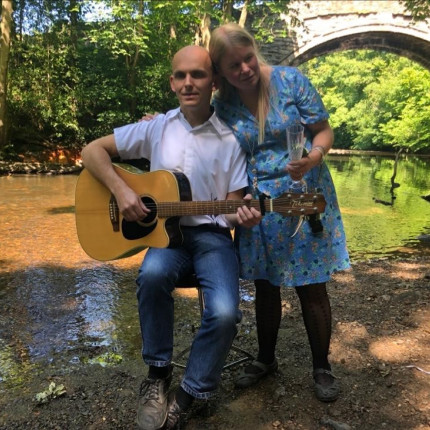Please note that as of October 220, we now operate as Sight Scotland. Our former name, Royal Blind will appear in content, such as reports, produced before that date.
Former Royal Blind School pupil, Vicky Haylott is a singer-songwriter and former music teacher, while her husband Robbie is a software engineer. They are both completely blind. The couple live in Dalkeith with their three children: Aiden, 14, who has no vision and attends the Royal Blind School, and seven-year-old twins, Blake and Freya, who are both sighted. They believe they are among many blind and partially sighted people who feel abandoned in the midst of the measures being taken to deal with the impact of Coronavirus.
Vicky Haylott says:
"Since 2001, our family has had a weekly online shopping order. However, from this week onwards, we will be reliant on local authority food parcels, as there are no delivery slots available at their usual supermarket or any others for the foreseeable future.
Having been long-term customers of online shopping for years, we are bitterly disappointed at this situation and feel we have been forgotten at the very moment when we need this service the most.
"Supermarkets are now totally inaccessible for blind and partially sighted people due to social distancing. The majority of blind and partially sighted people do not have a guide dog and often rely on touch and guiding from another person to navigate the shop. Under social distancing measures, this is no longer possible. For people with visual impairment who can shop, social distancing markers on floors and the introduction of one-way routes around supermarkets cannot easily be navigated by either long cane or guide dog users. There have even been cases where supermarkets have refused to accept paper shopping lists from people with visual impairment for fear of spreading the virus.
"The situation has created a genuine emergency for many blind people; some without family or friends living nearby so they literally do not know where their next meal is coming. Along with other campaigners, I have inundated supermarkets with calls, tweets and letters to prompt them to address this injustice.
"I fear the public are being given a false sense that blind people and those with other disabilities have all their needs taken care of and are coping well during the crisis. While the pandemic has inspired many acts of kindness and community solidarity, the media focus on positive stories has obscured the reality that many vulnerable people have been left behind and are really struggling and that unequal outcomes that were already prevalent have been compounded in this crisis.
"However, I also believe that, despite facing considerable challenges, in some ways blind and partially sighted people are uniquely well-equipped to cope. While the pandemic has brought about a complete lifestyle change for much of the public, many people with sight loss are already used to spending time in their own company and resilient to some of the challenges of social distancing. This is particularly prevalent among those who have the correct provision and education from an early age. Many blind people are also well versed in technological alternatives and should be empowered during the pandemic to use their expertise in creative ways.
"Blind people need not be victims in this crisis, they can lead by example on how to make the best out of difficult circumstances. However, they cannot do this unless basic provisions are guaranteed. Adding blind and partially sighted people to the list of vulnerable people would help to ensure this."
